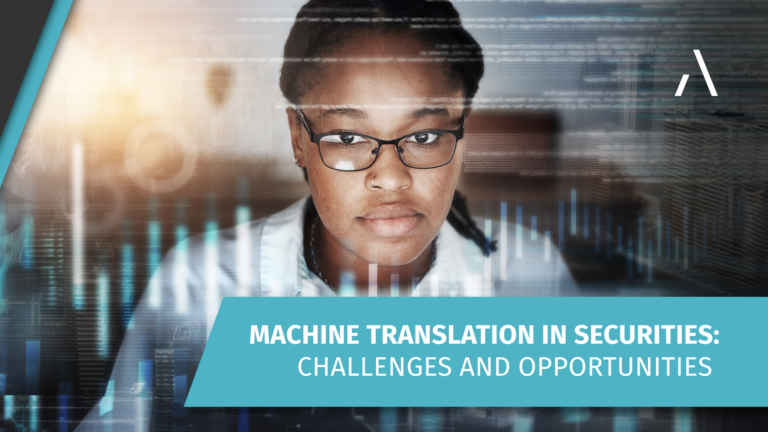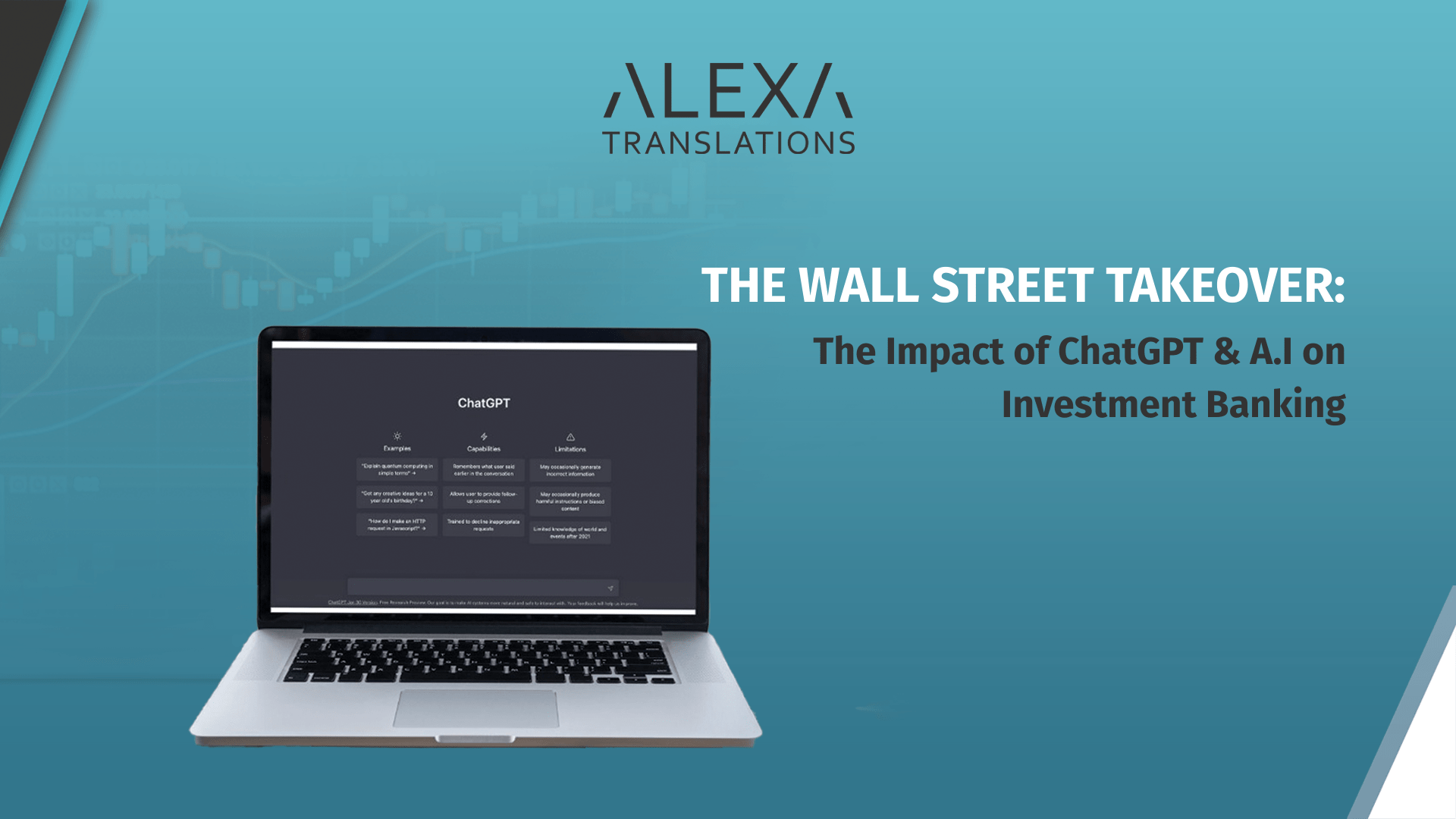
The Wall Street Takeover: The Impact of ChatGPT & A.I. on Investment Banking


The talk about artificial intelligence had been heating up for almost a decade. Companies like Google and IBM had been touting their A.I. engines for a long while, though you could not actually interact with them.
The release of ChatGPT, the viral chatbot from OpenAI, changed the discussion forever.
For the first time, people can engage with an A.I. tool that is able to generate human-like text in a conversational way. The popularity of the platform is undeniable -- ChatGPT has amassed over 100 million users since its inception only a few months ago
A.I.’s ability to converse with humans highlights its natural language processing (NLP) capabilities. ChatGPT has been trained on a massive corpus of text and is already being used across many industries, from customer support to financial markets analysis.
And now ChatGPT and other A.I. tools are attracting the attention of Wall Street, with companies like Microsoft already investing large sums in OpenAI.
At its core, ChatGPT is an AI-powered chatbot platform that interacts in a conversational manner. It is capable of writing code, poems, songs, and can even emulate the style of specific writers.
Unlike other chatbot solutions, ChatGPT leverages the power of artificial intelligence and natural language processing (NLP) to understand queries and respond in real-time.
It is important to note that chatbots have been around for quite a while. However, these were mostly rules-based, where companies could pre-program specific responses.
ChatGPT, on the other hand, relies on deep learning to generate responses. It is built on the transformer architecture, which was introduced in 2017 and has since become the foundation of many of the most advanced language models.
Overall, the technology behind ChatGPT is a combination of deep learning techniques, transformers, and a vast amount of training data, which together allow the model to generate highly sophisticated and human-like responses to natural language inputs.
ChatGPT’s rise to popularity reshaped mass opinions about A.I. and redefined the boundaries of what A.I. was capable of. It did not take long before companies were clamoring to invest in the A.I. sector.
For instance, in January 2023, Microsoft invested $10 billion in ChatGPT, building on their initial $1 billion investment in 2019.
That was just the tip of the iceberg, however. Versus Systems, a small B2B technology company, saw a 400% growth in January 2023.
In fact, according to an eMarketing trends survey conducted by JPMorgan, almost 53% of all traders believe that A.I. will likely have the greatest impact on trading in the next three years.
In February 2023, the ChatGPT craze had a major effect on the market, as evidenced by a major stock rally:
For more context, C3.ai and SoundHound have both doubled their market value in a year, while BigBear.ai rose by a massive 700% in the same timeframe.
Microsoft’s investment in OpenAI also led to a positive impact, with shares climbing by up 4%. The stock price for Microsoft has increased by 17% in the past three months alone.
As you may have noticed, we are missing one big name from the conversation: Google. The technology giant has been touting the prowess of is A.I. models for quite a while, though they haven’t yet released anything to the public like OpenAI.
The company did respond, announcing the release of Bard (at the time of writing, Bard is not available to the general public), an experimental conversational service, hot on the heels of ChatGPT.
The release did not go so well, with internal employees criticizing the company over its “dumpster fire” response. Many have reported that the launch of Bard was “rushed” and “botched” and indicates an increasing level of dissatisfaction, as the service was announced to the public first before seeking internal feedback from employees.
Thrive Capital and Founders Fund, two of the world’s leading venture-capital firms, also announced that they are looking to buy OpenAI shares, around $300 million worth. The deal, if it goes through, could result in a $29 billion value for OpenAI.
A.I. tools are having a significant impact on investment by enabling investors to make more informed decisions, reduce risk, and identify new opportunities.
ChatGPT is one of several tools that finance professionals use. While it’s great for conversational dialogue and for seeking inspiration, specialized A.I. tools like Alexa Translations can help with streamlining communications and ensuring regulatory compliance..
Here are just a few ways by which finance professionals are leveraging A.I.:
Predictive analytics uses historical data and statistical models to identify patterns and trends in order to predict future outcomes.
By combining machine learning algorithms and artificial intelligence, predictive analytics can accurately forecast the most likely outcome of a particular situation.
This type of analysis enables businesses to make more informed decisions by predicting how customers may respond to certain changes in their environment or how markets may react to different events.
Investment bankers rely heavily on their ability to anticipate market movements in order to maximize their profits.
Predictive analytics can provide them with valuable insights into what will happen next in the markets they operate in, enabling them to adjust their strategies accordingly.
For instance, predictive analytics can help investors understand how potential investments or mergers could impact their portfolios and allow them to make better-informed decisions about where and when to invest their money.
Robo-advisors are automated investment services that use sophisticated algorithms to manage investments for individuals.
They use a range of data points such as age, risk tolerance, goals, and more to create a portfolio tailored to the individual investor’s needs.
The primary benefit of using a robo-advisor is cost savings associated with lower fees. Most traditional financial advisors charge much higher fees than robo-advisors do, making them much more affordable for most investors.
Additionally, many robo-advisers also offer access to a wide variety of investment options which may not be available through traditional advisors or brokers.
For finance professionals, being able to communicate with people from different parts of the world is essential.
However, language barriers can often make it difficult to understand each other, resulting in costly miscommunications and delays.
AI-powered translation systems are built on deep neural networks (DNNs). These DNNs are computer algorithms that can learn from data and then use that knowledge to recognize patterns in new data sets.
In the case of translation, these DNNs are trained on large datasets consisting of thousands of previously translated sentences or phrases.
The Alexa Translations A.I. is specially trained for translating legal and financial documents, and supports 10 languages, including French-Canadian, Simplified Chinese, and Brazilian-Portuguese.
Historically, fiscal document translation has often been a cost center for organizations. However, with solutions like the Alexa Translations A.I. platform, companies can free up tied resources, cut costs, and streamline communication.